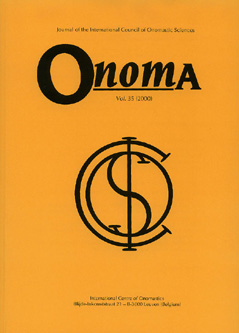 previous article in this issue previous article in this issue | next article in this issue  |

Preview first page |
Document Details : Title: Schliesslich ... Beschäftigung mit Namen in der Literatur Subtitle: (Finally ... Investigating Names in Literature) Author(s): NICOLAISEN, W.F.H. Journal: Onoma Volume: 40 Date: 2005 Pages: 29-41 DOI: 10.2143/ONO.40.0.2033069 Abstract : This essay addresses itself to a readily observable phenomenon that, in general onomastic compendia or handbooks, the treatment of names in literature is usually found at the end or in a peripheral position. While there were initially certain historical reasons within the evolution of scholarly name studies for that situation, it is now often the seeming inability to treat names in literary and non-literary environments by casting them in different or even opposing categories, that creates such inadmissible taxonomic sets as “Place names, personal names, literary names,…”, since place names and personal names, as well as all other kinds of names, can be both literary and non-literary, thus qualifying for both classes. In this essay it is argued that, in spite of the emergence of a discernible intellectual endeavour called Literary Onomastics, some kind of radical rethinking is necessary which would, at least occasionally, reroute habitual research strategies by taking into account, on the one hand, non-literary uses of place names, personal names, etc., when studying them in literary contexts, and taking into consideration their application as literary devices when primarily treating them in non-literary situations. Cet article aborde un phénomène aisément observable, à savoir que, dans les précis ou manuels d’onomastique générale, le traitement des noms dans la littérature se trouve habituellement en position finale ou accessoire. Alors qu’il y avait, au début, certaines raisons historiques à cette évolution des études onomastiques savantes, on constate souvent, aujourd’hui, une incapacité apparente à traiter des noms dans des environnements littéraires ou non, en les distribuant dans des catégories différentes voire même opposées, ce qui crée des situations inadmissibles de taxonomie, comme «noms de lieux, noms de personnes, noms littéraires…», puisque les noms de lieux et de personnes, comme toutes autres sortes de noms, peuvent être à la fois littéraires et non littéraires, dotés des qualités pour les deux classes. Dans cet article, je soutiens que, en dépit de l’émergence d’un certain effort intellectuel appelé l’Onomastique littéraire, une sorte de remise en cause radicale est nécessaire qui, parfois au moins, dérouterait les stratégies habituelles de la recherche, d’une part en prenant en compte les emplois non littéraires des noms de lieux, de personnes etc. en les étudiant dans des contextes littéraires, d’autre part en prenant en considération leur application comme procédés littéraires en les traitant essentiellement dans des situations non littéraires. Der Aufsatz befasst sich mit dem in onomastischen Handbüchern auftretenden Phänomen, dass man die Behandlung von literarischen Namen entweder am Ende oder nur am Rande findet. Während es anfänglich dafür historische Gründe der wissenschaftlichen Behandlung von Namen gab, scheint es jetzt oft die Unfähigkeit zu sein, Namen in literarischer und nicht-literarischer Umgebung zu behandeln, indem man sie in unterschiedlichen oder gegensätzlichen Kategorien einordnet. Dies führt zu so inakzeptablen Gliederungen wie „Ortsnamen, Personennamen, literarische Namen…“. Orts- und Personennamen sowie alle anderen Namenarten können nämlich sowohl literarisch als auch nicht-literarisch sein, also zu beiden Klassen gehören. In dem Aufsatz wird behauptet, dass – trotz erheblicher intellektueller Anstrengungen, „Literarische Onomastik“ genannt – ein radikales Umdenken notwendig ist, das die gewohnten Forschungsstrategien verändert, indem man einerseits die nichtliterarische Verwendung von Orts-, Personennamen usw., wenn sie im literarischen Kontext erforscht werden, berücksichtigt, und andererseits ihre Verwendung als literarisches Mittel betrachtet, wenn sie primär in nicht-literarischen Kontexten behandelt werden. |
|


